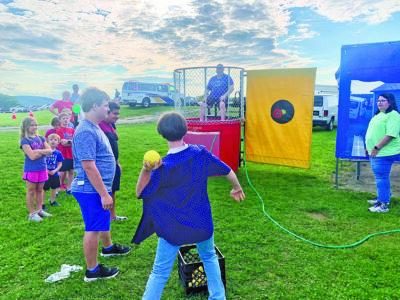Tips for keeping cool throughout week’s heatwave
LEWISTOWN — As temperatures soar into the mid- to high-90s this week, we welcome back “Heatwave U.S.A.”
A changing global climate is causing higher temperatures and heatwaves to become more frequent, staying cool isn’t just about comfort, it’s about staying safe.
Whether you’re outside trying to enjoy the sunshine or trying to keep your home bearable, health experts warn extreme heat can pose serious health risks for vulnerable groups like some over the age of 65; teenagers, children and young people; anyone who is pregnant or suffers from a chronic or underlying health condition; anyone who works outside; and anyone who is homeless.
These practical, life-saving tips from the American Red Cross and other area health professionals can help beat the heat and offer protection during hot weather. Tips include:
• Be sun smart — It’s best to avoid going out during the hottest hours of the day, but sometimes that can’t be avoided. When out in direct sunlight remember to wear sunscreen; cover your head with a hat; take regular breaks indoors or in a shady area; and wear light-colored or loose-fitting clothing.
“Wear light-colored, loose-fitting clothing — avoid cotton, as it tends to retain heat and moisture,” cautioned Jaimie Smith, a nurse practitioner who sees patients at Geisinger Lewistown Clinic.
• Wetter is better — Heat escapes through the skin, so the more skin you can cool down, the better. There are various ways to do that, such as buying cooling spray, taking a cool shower or putting your hands and feet in cold water.
• Drink plenty of water — In hot weather, it’s important to avoid caffeine and drink lots of water. If possible, drink sports drinks to replenish the lost salts, sugars, and fluids. As you sweat throughout the day, the liquids you are losing need to be replaced to avoid dehydration.
“During extreme heat, it’s essential to stay hydrated and avoid overheating,” Smith added. “Drink water regularly throughout the day, even if you don’t feel thirsty, and steer clear of alcohol or sugary beverages, which can contribute to dehydration.”
Symptoms of dehydration include: dry mouth; dizziness or confusion; or headaches. If untreated, dehydration can lead to heat exhaustion.
Limit your alcohol — Mixing too much sun with a few too many drinks is not a good combination. Alcohol causes dehydration, which can hit especially hard if your body is already struggling to stay cool.
Eat light meals to feel cooler — When it’s hot, it’s far better to stick to light, well-balanced, regular meals. Food with a high-water content like strawberries, cucumber, celery and lettuce, will also help to keep you hydrated and cool in summer weather.
Limit physical activity to cooler parts of the day — It’s important not to disrupt your routine too much because of hot weather, but sometimes there’s no other choice. An early morning run might feel punishing when you’re nice and sleepy in bed, but it could be dangerous to exercise in the blazing midday sun and risk dehydration, heat exhaustion or heatstroke.
“Avoid yard work or outdoor activities between 9 a.m. and 5 p.m.; instead, aim to get an early start or wait until the evening when temperatures are lower,” Smith explained.
“Gradually easing into outdoor activities and using sun protection like sunscreen and UV-protective clothing can also help reduce the risk of heat-related illness,” Smith added.
Keep your home cool — It’s important to make your home a place you can escape to out of the heat, so keeping it cool is paramount to feeling comfortable. When temperatures reach heatwave levels, this can be more challenging than you might realize. It’s not as easy as just opening a window. It’s also crucial at night as heatwaves can make it difficult to get a good night’s sleep.
“Take frequent breaks in shaded or air-conditioned areas, and if you have a basement, consider spending time there to stay cool,” Smith said.
Know the risks — The heat can have a serious effect on your physical health, especially during a heatwave. It’s important to look out for signs of heatstroke and heat exhaustion. Many people believe that heat exhaustion and heatstroke are the same things, but heatstroke is potentially far more serious. Heat exhaustion is caused when the body loses excess water, salt, and sugars through sweating, while heat stroke occurs when the body’s temperature becomes dangerously high and the body is no longer able to cool itself.
“Common signs of dehydration and heat stroke include dizziness, weakness, headaches, and vomiting,” Smith explained. “Seek medical attention if you notice these symptoms.”
Staying cool and safe in a heatwave — As a result of climate change, heatwaves are becoming more frequent and extreme. Hot weather puts people’s health and wellbeing at risk and knowing how to keep cool in a heatwave is essential.
“If you start to feel dizzy, confused, or excessively sweaty, move to a cooler place and hydrate immediately — these could be early signs of heat exhaustion or heat stroke, which requires urgent attention,” Smith said.

